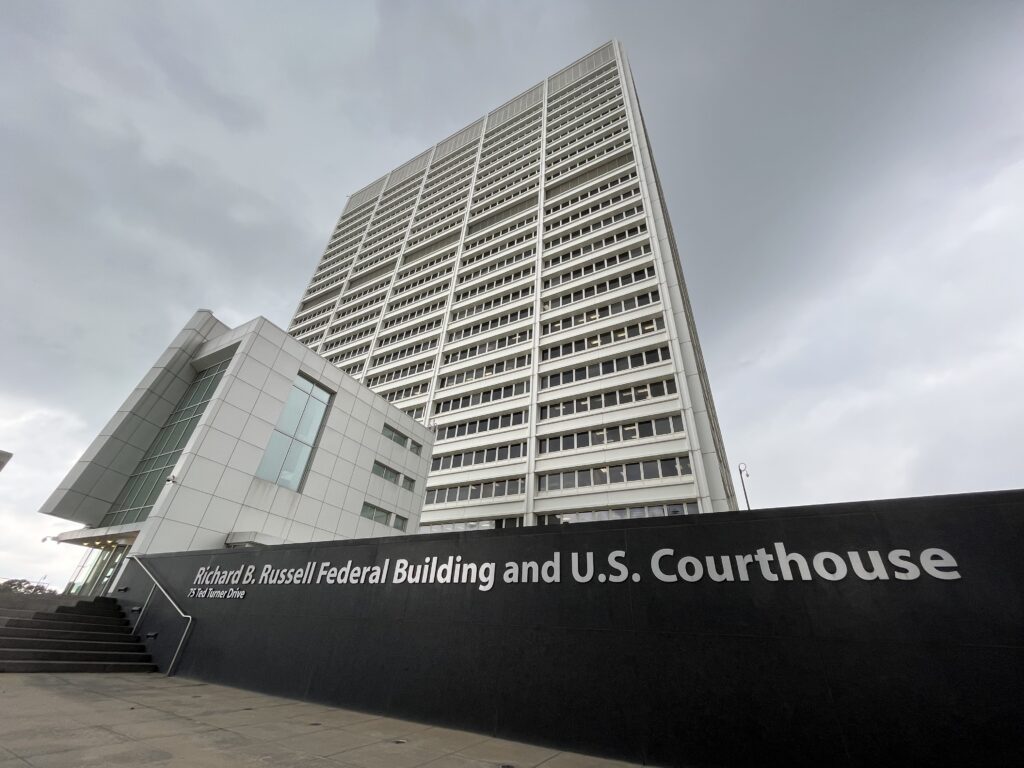
A federal judge heard arguments this week on a Georgia law aimed at restricting social media use for minors and requiring Georgians to confirm their age before viewing adult websites.
Judge Amy Totenberg of the U.S. District Court for the Northern District of Georgia announced at the Tuesday hearing that she will determine soon whether to hear more evidence regarding a lawsuit by a group called NetChoice to stop the law. NetChoice represents various internet-based services, including powerful businesses like Google and Meta, as well as smaller companies like online journal site Dreamwidth Studios. On the same day, a Florida judge blocked sections of a similar Florida law.
Children under the age of 16 would need parental consent to open social media accounts under the new Georgia law, which is set to go into effect July 1.
NetChoice filed a lawsuit in May seeking to prevent that from happening. The companies claim the rules violate young people’s First Amendment rights, as well as place unnecessary burdens on social media companies. Attorneys also argued the revised rules strip away some of the flexibility of parents monitoring what online sites their children are accessing.
Jeremy Maltz, an attorney representing NetChoice in the lawsuit, argued at Tuesday’s court hearing that many people using online websites affected by the Georgia law would consider it an invasion of privacy if they had to use sensitive information to create an account.
The plaintiffs argue that adults could face a burden if companies require them to potentially give companies driver licenses, banking or credit card information or use facial recognition software in order to access user-generated online sites.
Data breaches and other cyber security threats could be increased by the new age guidelines, Maltz said.
“We know people are going to have to provide some sort of information to access protected speech,” he said.
And despite the law exempting educational, public safety, and professional networking platforms, Martz said it would also create new verification hurdles even for innocuous sites such as college football and recipe message boards.
“This bill targets minors at the places where minors go to engage in free speech,” Maltz said.
Republican state lawmakers push for Georgia law to require proof of adulthood to view adult websites
Georgia lawmakers passed SB 351 in 2024 with bipartisan support. Logan Winkles, a state deputy attorney general, said that social media is designed to drive engagement and promote addiction, and the intent of legislators in passing the law was to protect children from adult bad actors online.
“Everyone agrees that social media poses some risk to children,” Winkles said.
NetChoice successfully overturned similar laws in Arkansas and Ohio after arguing they unfairly censored free speech on online platforms.
What’s my age again?
The bill requires social media companies to make commercially reasonable efforts to verify the age of their users, which can be done through methods including banking and credit card accounts, facial and fingerprint recognition software scanning.
The Age Verification Providers Association, which supports third-party age verification businesses, reports that about a dozen states have passed laws restricting or requiring parents to consent to minors accessing social media. In several states, including Arkansas, California and Ohio, court orders have been issued to block the provisions of the law.
As of May, the age verification group listed Georgia among the 24 states that have passed laws requiring age verification to access online pornography.
Opponents say such laws could create privacy concerns and prevent people from accessing constitutionally protected speech.
Winkles said at Tuesday’s hearing that legislators and Gov. Brian Kemp backed the law to protect more kids and teens from social media sites that lead to higher rates of bullying and mental health problems such as depression and that technology can estimate a person’s age without revealing their identity.
“What we know is there are many other ways to verify ID other than showing government ID,” Winkles said.
But Totenberg questioned the verification processes.
“It doesn’t seem very precise,” Totenberg said. “It’s a highly subjective standard and I’m not sure what it ultimately means.”
The law allows parents and guardians to file complaints with the attorney general office if they believe a company isn’t complying with age verification. Violations of the law may result in a fine of up to $2,500 per violation.
Pending U.S. Supreme Court age restriction ruling
On Tuesday, federal Judge Mark Walker of the northern district of Florida blocked sections of Florida’s law banning children under 14 from having social media accounts and requiring parents’ approval for teens as old as 16 while expressing concerns about social media’s adverse effects on children.
Georgia attorneys contend that the state’s new social media rules stand up to legal scrutiny and differ from states like Florida, which limited companies’ ability to control user-posted content. Right wing officials from several states have expressed concerns about social media companies blocking conservative viewpoints.
John Acevedo, an Emory University constitutional law professor, pointed out that when it’s pornography, there has been a legal history showing a legitimate interest in protecting children.
“Really, it’s not controversial to put an age requirement in, but the controversy is the manner in which the age requirement is implemented,” he said Wednesday. “Conversely, in social media there’s a controversy over whether we should even limit social media at all to any age group.”
GET THE MORNING HEADLINES.
This post was originally published on this site be sure to check out more of their content







